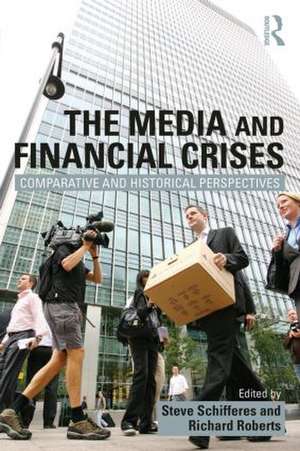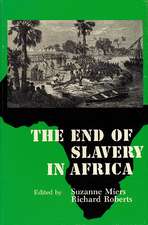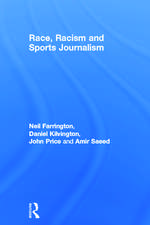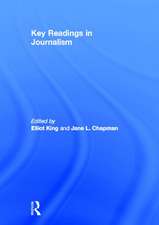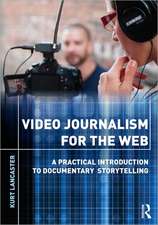The Media and Financial Crises: Comparative and Historical Perspectives
Editat de Steve Schifferes, Richard Robertsen Limba Engleză Paperback – 28 aug 2014
Editors Steve Schifferes and Richard Roberts have assembled an expert set of contributors, including Joseph E Stiglitz and Lionel Barber, editor of the Financial Times. The role of the media has been central in shaping our response to the financial crisis. Examining its performance in comparative and historical perspectives is crucial to ensuring that the media does a better job next time.
The book has five distinct parts:
- The Banking Crisis and the Media
- The Euro-Crisis and the Media
- Challenges for the Media
- The Lessons of History
- Media Messengers Under Interrogation
| Toate formatele și edițiile | Preț | Express |
|---|---|---|
| Paperback (1) | 408.49 lei 6-8 săpt. | |
| Taylor & Francis – 28 aug 2014 | 408.49 lei 6-8 săpt. | |
| Hardback (1) | 1005.80 lei 6-8 săpt. | |
| Taylor & Francis – sep 2014 | 1005.80 lei 6-8 săpt. |
Preț: 408.49 lei
Nou
Puncte Express: 613
Preț estimativ în valută:
78.16€ • 81.62$ • 64.54£
78.16€ • 81.62$ • 64.54£
Carte tipărită la comandă
Livrare economică 15-29 aprilie
Preluare comenzi: 021 569.72.76
Specificații
ISBN-13: 9781138022799
ISBN-10: 1138022799
Pagini: 338
Ilustrații: 10 black & white tables, 28 black & white line drawings
Dimensiuni: 156 x 234 x 23 mm
Greutate: 0.59 kg
Ediția:1
Editura: Taylor & Francis
Colecția Routledge
Locul publicării:Oxford, United Kingdom
ISBN-10: 1138022799
Pagini: 338
Ilustrații: 10 black & white tables, 28 black & white line drawings
Dimensiuni: 156 x 234 x 23 mm
Greutate: 0.59 kg
Ediția:1
Editura: Taylor & Francis
Colecția Routledge
Locul publicării:Oxford, United Kingdom
Public țintă
Postgraduate and UndergraduateCuprins
Editors’ Introduction Overview: Soothsayers of Doom? PART I The Banking Crisis and the Media 1. Willful Blindness: The Media's Power Problem 2. Why the Media Got It Right 3. The US Media and the 2009 Stimulus Package 4. The British Media and the ‘First Crisis of Globalization’ 5. From Wall Street to Main Street: Australian Finance and Business Journalism and the Crisis PART II The Euro-Crisis and the Media 6. The Irish Press, Politicians, and the Celtic Tiger Economy 7. The Spanish Press: No Illusions 8. European Media Views of the Greek Crisis PART III Challenges for the Media 9. What Are Financial Journalists For? 10. The Media and the Crisis: An Information Theoretic Approach 11.Why the Public Doesn’t Trust the Business Press 12. The Mediation of Financial Information Flows: Traders, Analysts, Journalists 13. Paying for Crisis News: The Dilemmas of News Organizations PART IV The Lessons of History 14. Financial Crises and the Birth of the Financial Press, 1825–1880 15. Boom, Crisis, Bust: Speculators, Promoters, and City Journalists, 1880–1914 16. ‘Run on the Bank’: Covering the 1914 Financial Crisis 17. The Pound and the Press, 1919–1972 18. ‘Goodbye, Great Britain’? The Press, the Treasury, and the1976 IMF Crisis PART V Media Messengers Under Interrogation 19 UK Financial Journalists Quizzed by MPs
Recenzii
"This elegantly conceived and meticulously executed collection scores a palpable double hit: deepening our understanding of financial crises and transforming our knowledge of financial journalism. Above all it marks a historiographical step-change through its sophisticated reading across the last two centuries of that elusive but symbiotic relationship between the ‘actors’ (whether individuals or markets) and their interpreters in the media. To anyone seriously interested in financial matters, this is a mandatory text."
David Kynaston, professional historian and author of The Financial Times: A Centenary History
"This is a cogent and multidimensional examination of business and financial reporting during times of economic crises and commercial fiascos. It provides insightful and integrated analysis of the roles, quandaries and performance of media during economic shocks across the past two centuries and is a compelling appraisal of how media cover and influence economic, financial, and commercial activities and public responses."
Robert G. Picard, Reuters Institute, Department of Politics and International Relations, University of Oxford
"The media and the financial sectors are both criticised for being over-powerful and lacking public accountability. This collection of essays - from some of the most knowledgeable academics with experience of both fields - tackles that issue head-on and is essential reading for anyone interested in the role and effectiveness of business journalism."
Richard Sambrook, Professor of Journalism and Director of the Centre for Journalism, Cardiff University
David Kynaston, professional historian and author of The Financial Times: A Centenary History
"This is a cogent and multidimensional examination of business and financial reporting during times of economic crises and commercial fiascos. It provides insightful and integrated analysis of the roles, quandaries and performance of media during economic shocks across the past two centuries and is a compelling appraisal of how media cover and influence economic, financial, and commercial activities and public responses."
Robert G. Picard, Reuters Institute, Department of Politics and International Relations, University of Oxford
"The media and the financial sectors are both criticised for being over-powerful and lacking public accountability. This collection of essays - from some of the most knowledgeable academics with experience of both fields - tackles that issue head-on and is essential reading for anyone interested in the role and effectiveness of business journalism."
Richard Sambrook, Professor of Journalism and Director of the Centre for Journalism, Cardiff University
Descriere
The Media and Financial Crises provides unique insights into the debate on the role of the media in the global financial crisis. Offering broad and coherent coverage, editors Steve Schifferes and Richard Roberts have assembled an expert set of contributors, making it ideal for both students and scholars of financial journalism, journalism studies, media studies, and media and economic history.
